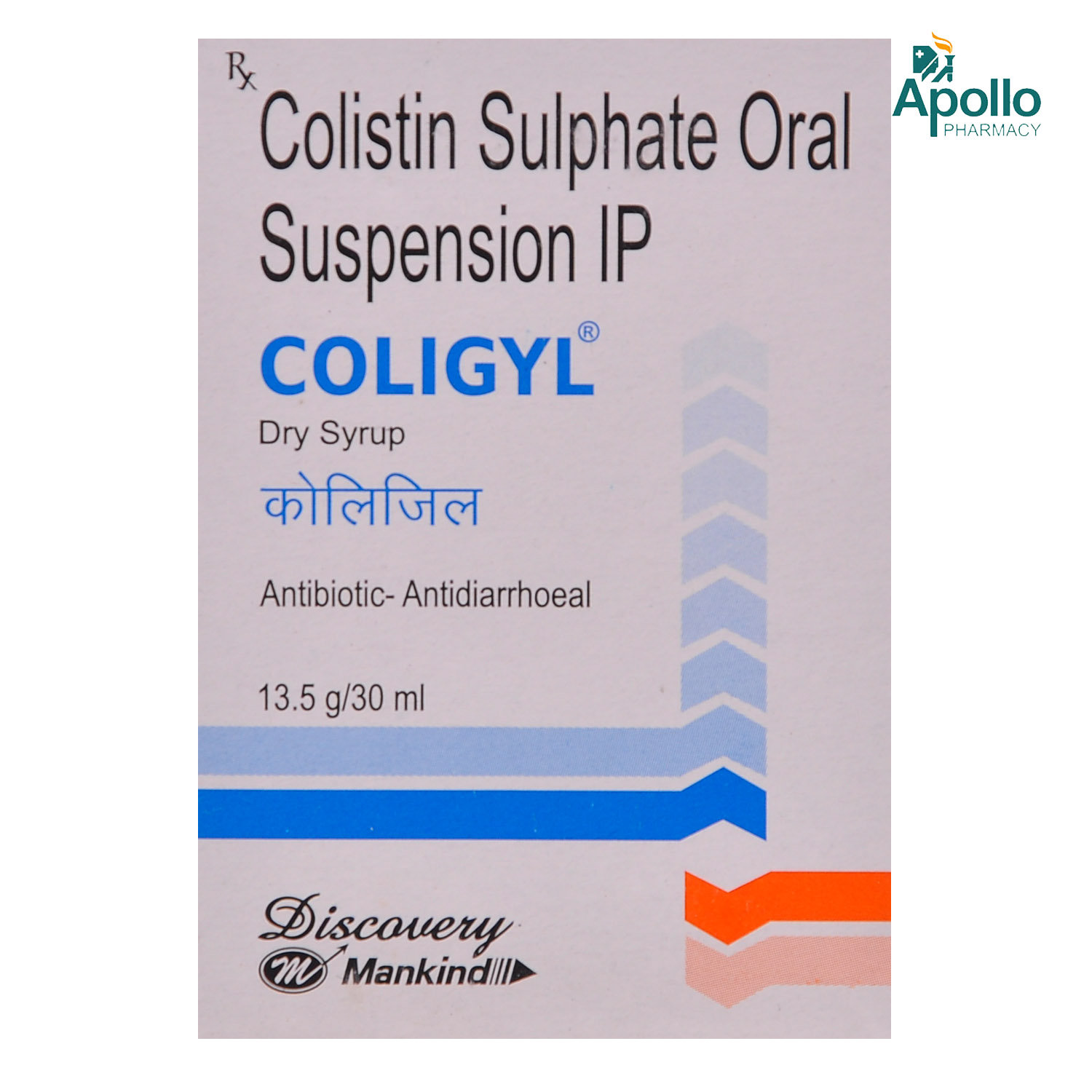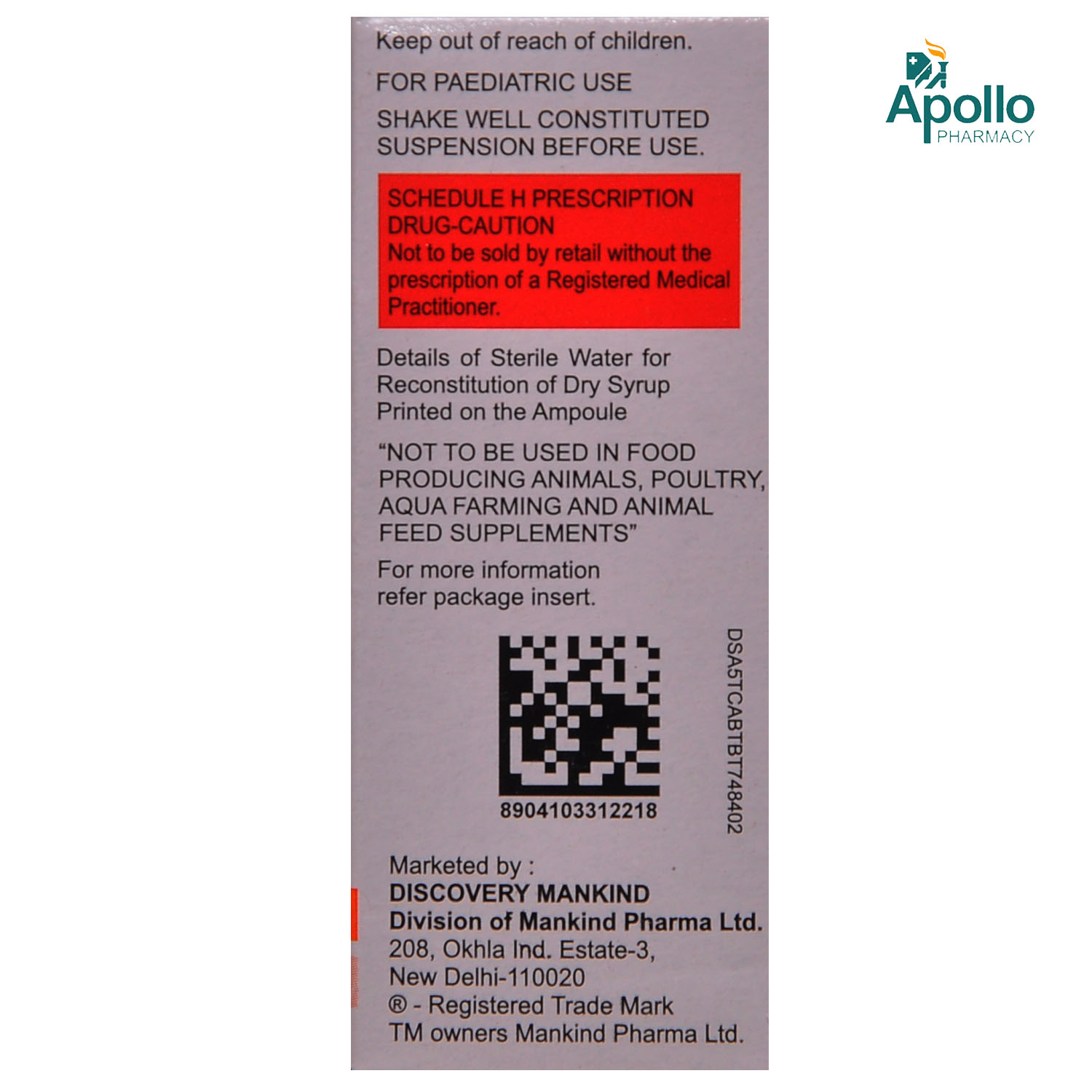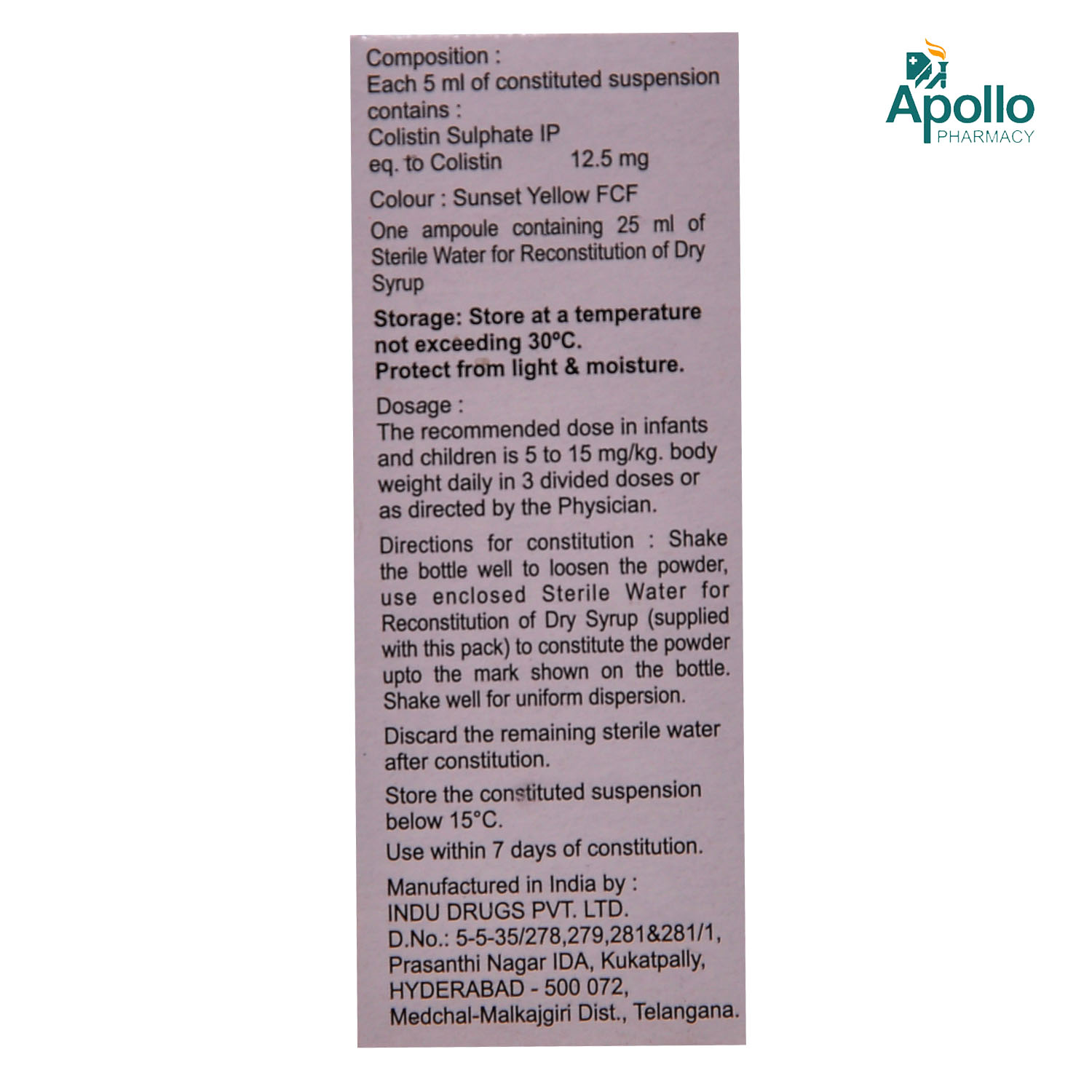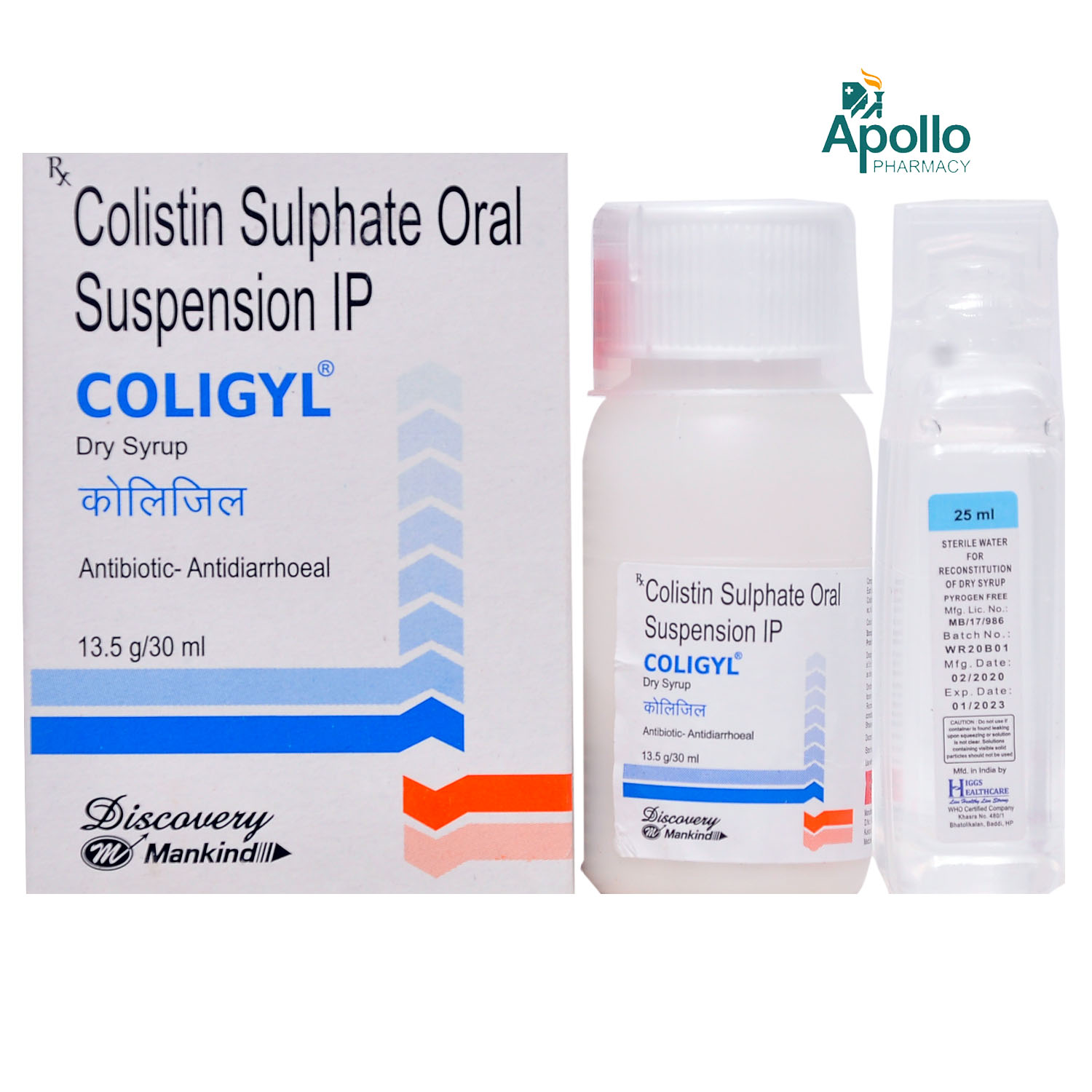Coligyl Dry Syrup 30 ml
MRP ₹61.5
(Inclusive of all Taxes)
₹9.2 Cashback (15%)
Provide Delivery Location
Online payment accepted
 Prescription drug
Prescription drugWhats That
Composition :
Manufacturer/Marketer :
Consume Type :
Expires on or after :
Return Policy :
About Coligyl Dry Syrup
Coligyl Dry Syrup belongs to the class of medications called ‘antibiotics’ used to treat bacterial infections caused by susceptible Gram-negative bacteria. Bacterial infections are caused by the multiplication of harmful bacteria inside or on the body. These harmful bacteria produce chemicals known as toxins, which can damage tissue and make you sick. Symptoms of bacterial infection vary depending on the organ affected by bacteria.
Coligyl Dry Syrup contains Colistin Sulphate. Colistin effectively solubilizes the bacterial cell membrane, resulting in bacterial cell death. As a result, Coligyl Dry Syrup destroys the bacteria and successfully treats the infection.
Take Coligyl Dry Syrup as prescribed by your doctor. Depending on your medical condition, you are advised to take Coligyl Dry Syrup for as long as your doctor prescribes it. Sometimes, you may experience common side effects like dizziness, upset stomach, rash, diarrhoea, vertigo (spinning sensation), paresthesia (tingling or pricking sensation) and slurred speech. But these side effects are usually in the initial phase and resolve over time. However, if these side effects persist, let your doctor know.
Before receiving Coligyl Dry Syrup, let your doctor know about all your medical conditions, sensitivities, and all medications you are using. And also, inform your doctor if you are pregnant, planning pregnancy, or breastfeeding. Coligyl Dry Syrup can cause blurred vision and dizziness in some people; if this occurs, do not drive or operate tools or machinery. It is recommended not to consume any alcoholic beverages while on treatment with this medicine.
Uses of Coligyl Dry Syrup
Directions for Use
Key Benefits
Coligyl Dry Syrup contains Colistin Sulphate, which is used for treating acute or chronic infections due to sensitive strains of certain gram-negative bacilli, particularly Pseudomonas aeruginosa. Colistin sulphate effectively solubilizes the bacterial cell membrane, resulting in bacterial cell death. As a result, Coligyl Dry Syrup destroys the bacteria and successfully treats the infection.
Storage
- Inform Your Doctor: Notify your doctor immediately about your diarrhoea symptoms. This allows them to adjust your medication or provide guidance on managing side effects.
- Stay Hydrated: Drink plenty of fluids to replace lost water and electrolytes. Choose water, clear broth, and electrolyte-rich drinks. Avoid carbonated or caffeinated beverages to effectively rehydrate your body.
- Follow a Bland Diet: Eat easy-to-digest foods to help firm up your stool and settle your stomach. Try incorporating bananas, rice, applesauce, toast, plain crackers, and boiled vegetables into your diet.
- Avoid Trigger Foods: Steer clear of foods that can worsen diarrhoea, such as spicy, fatty, or greasy foods, high-fibre foods, and dairy products (especially if you're lactose intolerant).
- Practice Good Hygiene: Maintain good hygiene to prevent the spread of infection. To stay healthy, wash your hands frequently, clean and disinfect surfaces regularly, and avoid exchanging personal belongings with others.
- Take Anti-Diarrheal Medications: If your doctor advises, anti-diarrheal medications such as loperamide might help manage diarrhoea symptoms. Always follow your doctor's directions.
- Keep track of your diarrhoea symptoms. If they don't get better or worse or are accompanied by severe stomach pain, blood, or dehydration signs (like extreme thirst or dark urine), seek medical help.
- Drink water or other clear fluids.
- To prevent worsening of pain, limit intake of tea, coffee, or alcohol.
- Include bland foods like rice, toast, crackers, and rice in your diet.
- Avoid lying down immediately after eating as it may cause indigestion or heartburn.
- Avoid acidic and spicy food as it may cause indigestion.
- Preventing Vomiting (Before it Happens)
- Take medication exactly as prescribed by your doctor. This can help minimize side effects, including vomiting.
- Having a small meal before taking your medication can help reduce nausea and vomiting.
- Talk to your doctor about taking anti-nausea medication along with your prescribed medication.
- Managing Vomiting (If it Happens)
- Try taking ginger in the form of tea, ale, or candy to help alleviate nausea and vomiting.
- What to Do if Vomiting Persists
- Consult your doctor if vomiting continues or worsens, consult the doctor for guidance on adjusting your medication or additional treatment.
- Inform your doctor about your constipation symptoms. They may adjust your medication or advise alternative treatments.
- Stay hydrated by drinking sufficient of water (at least 8-10 glasses a day) to help soften stool and promote bowel movements.
- Increase fibre intake by eating foods high in fibre, such as fruits, whole grains, vegetables and legumes, to help bulk up the stool.
- Establish a bowel routine by trying to go to the bathroom at the same time each day to train your bowels.
- Engaging in regular exercise, like walking or yoga, can support in bowel movement stimulation.
- Consult your doctor if constipation persists, and discuss alternative treatments or adjustments to your medication.
- Inform your doctor about the nausea and discuss possible alternatives to the medication or adjustments to the dosage.
- Divide your daily food intake into smaller, more frequent meals to reduce nausea.
- Opt for bland, easily digestible foods like crackers, toast, plain rice, bananas, and applesauce.
- Avoid certain foods that can trigger nausea, such as fatty, greasy, spicy, and smelly foods.
- Drink plenty of fluids, such as water, clear broth, or electrolyte-rich beverages like coconut water or sports drinks.
- Use ginger (tea, ale, or candies) to help relieve nausea.
- Get adequate rest and also avoid strenuous activities that can worsen nausea.
- Talk to your doctor about taking anti-nausea medication if your nausea is severe.
- Record when your nausea occurs, what triggers it, and what provides relief to help you identify patterns and manage your symptoms more effectively.
- Rest well; get enough sleep.
- Eat a balanced diet and drink enough water.
- Manage stress with yoga and meditation.
- Limit alcohol and caffeine.
- Physical activities like walking or jogging might help boost energy and make you feel less tired.
Drug Warnings
Before taking the Coligyl Dry Syrup, let your doctor know about all your medical conditions, sensitivities, and all medications you are using. Inform your doctor if you are pregnant, planning to become pregnant, or are breastfeeding before receiving Coligyl Dry Syrup. Also, inform your doctor if you have chronic kidney disease, myasthenia gravis (muscle disorder), and porphyria (a blood disorder). Do not abruptly discontinue taking the prescription since this may result in antibiotic resistance, a condition in which bacteria develop resistance to antibiotics.
Drug-Drug Interactions
Drug-Drug Interactions
Login/Sign Up
Coadministration of Coligyl Dry Syrup 30 ml along with BCG vaccine can reduce the treatment outcomes.
How to manage the interaction:
Taking Coligyl Dry Syrup 30 ml with BCG vaccine is avoided as it may lead to an interaction, please consult your doctor before taking it.
Co-administration of Coligyl Dry Syrup 30 ml with Gentamicin can increase the levels and risk of Coligyl Dry Syrup 30 ml side effects.
How to manage the interaction:
Although there is a possible interaction between Coligyl Dry Syrup 30 ml and Gentamicin, you can take these medicines together if prescribed by your doctor. However, if you experience weight gain or loss suddenly, muscle pain, dizziness, or palpitations, call your doctor right away. Do not stop using any medications without a doctor's advice.
Coadministration of Streptomycin with Coligyl Dry Syrup 30 ml may increase the risk of side effects.
How to manage the interaction:
Although there is a possible interaction between Coligyl Dry Syrup 30 ml and Streptomycin, you can take these medicines together if prescribed by your doctor. However, if you experience shortness of breath, muscle pain, dizziness, or palpitations, call a doctor right away. Do not stop using any medications without a doctor's advice.
Using Vecuronium with Coligyl Dry Syrup 30 ml can make Vecuronium more effective in therapy.
How to manage the interaction:
Although there is a possible interaction between Coligyl Dry Syrup 30 ml and Vecuronium, you can take these medicines together if prescribed by your doctor. However, if you experience an upset stomach, rash, dizziness, or fever, consult a doctor. Do not stop using any medications without a doctor's advice.
Taking Human immunoglobulin with Coligyl Dry Syrup 30 ml, may raise the risk of kidney problems.
How to manage the interaction:
There may be a possibility of interaction between Human immunoglobulin and Coligyl Dry Syrup 30 ml, but it can be taken if prescribed by a doctor. However, if you experience nausea, vomiting, loss of appetite, increased or decreased urination, sudden weight gain or loss, fluid retention, swelling, shortness of breath, muscle cramps, tiredness, weakness, dizziness, confusion, or an irregular heart rhythm, consult a doctor. Do not discontinue any medications without consulting a doctor.
Combining Coligyl Dry Syrup 30 ml with Iohexol can increase the effect or side effects of Iohexol.
How to manage the interaction:
Although there is a possible interaction between Coligyl Dry Syrup 30 ml and Iohexol, you can take these medicines if prescribed by your doctor. However, if you experience vomiting, loss of appetite, irregular urination, swelling, shortness of breath, muscle cramps, or weakness, consult a doctor. Do not stop using any medications without a doctor's advice.
Coadministration of Cisatracurium with Coligyl Dry Syrup 30 ml may increase the risk of side effects of Cisatracurium.
How to manage the interaction:
Although there is a possible interaction of Cisatracurium with Coligyl Dry Syrup 30 ml, it can be taken if prescribed by your doctor. However, if you experience an upset stomach, Rash, Dizziness, Slurred speech, Vertigo, or Fever, consult a doctor. Do not stop using any medications without a doctor's advice.
Coadministration of Coligyl Dry Syrup 30 ml with Amikacin can increase the risk of developing side effects.
How to manage the interaction:
Although there is a possible interaction between Coligyl Dry Syrup 30 ml and Amikacin, you can take these medicines together if prescribed by a doctor. Do not stop using any medications without a doctor's advice.
Coadministration of Coligyl Dry Syrup 30 ml with Everolimus can increase the risk of developing kidney problems.
How to manage the interaction:
Although there is a possible interaction between Coligyl Dry Syrup 30 ml and Everolimus, it can be taken if prescribed by a doctor. However, if you experience vomiting, irregular urination, sudden weight gain or loss, swelling, shortness of breath, or weakness, consult a doctor. Do not discontinue any medications without consulting a doctor.
Combining Coligyl Dry Syrup 30 ml with Neomycin can increase the risk or severity of kidney problems.
How to manage the interaction:
Although there is a possible interaction between Coligyl Dry Syrup 30 ml and Neomycin, you can take these medicines together if prescribed by your doctor. However, if you experience an upset stomach, Rash, Dizziness, or Fever, consult a doctor. Do not stop using any medications without a doctor's advice.
Drug-Food Interactions
Drug-Food Interactions
Login/Sign Up
Diet & Lifestyle Advise
- After taking the full course of Coligyl Dry Syrup, probiotics should be taken to restore some of the healthy bacteria in the intestine that may have been killed. Taking probiotics after antibiotic treatment can reduce the risk of antibiotic-associated diarrhoea. Certain fermented foods like yoghurt, cheese, sauerkraut and kimchi can restore the intestine's good bacteria stink.
- Include more fibre-enriched food in your diet, as it can be easily digested by gut bacteria, which helps stimulate their growth. Thus fibre foods may help restore healthy gut bacteria after taking a course of antibiotics. Whole grains, like whole-grain bread and brown rice, should be included in your diet.
- Avoid taking many calcium-enriched foods and drinks as it might affect the working of Coligyl Dry Syrup.
- Avoid intake of alcoholic beverages with Coligyl Dry Syrup as it can make you dehydrated and affect your sleep. This can make it harder for your body to aid the Coligyl Dry Syrup in fighting off infections.
Side Effects of Coligyl Dry Syrup
- Dizziness
- Upset stomach
- Rash
- Diarrhoea
- Kidney damage
- Vertigo (Spinning sensation)
- Paresthesia (tingling or pricking sensation)
- Slurred speech
Habit Forming
Therapeutic Class
All Substitutes & Brand Comparisons
RX
Out of StockNonumycin 12.5mg Syrup
₹31
(₹0.93/ 1ml)
49% CHEAPERRX
Out of StockHarmless 12.5mg Syrup
₹31.5
(₹0.95/ 1ml)
48% CHEAPERRX
Out of StockNelomycin 12.5mg Syrup
₹32
(₹0.96/ 1ml)
48% CHEAPER
Drug-Diseases Interactions
Drug-Diseases Interactions
Login/Sign Up
FAQs
Drug-Drug Interactions Checker List
- AZITHROMYCIN
- CLARITHROMYCIN
- ERYTHROMYCIN
- OFLOXACIN
- NORFLOXACIN
- CIPROFLOXACIN
- NETILIMICIN
- GENTAMICIN
- AMIKACIN
- TOBRAMYCIN
- ATRACURIUM
- CISATRACURIUM
- VECURONIUM
Special Advise
Disease/Condition Glossary
Bacterial infections: A bacterial infection is a condition in which harmful bacteria enter, multiply and infect the body. It can target any organ of the body and multiply very quickly. Many give off chemicals called toxins, which can damage tissue and make you sick. Bacterial infections vary from minor illnesses (like sore throat and ear infections) to severe brain infections (like meningitis and encephalitis). When you get infected with bacteria, you can experience generalized symptoms like fevers, chills and fatigue. A few harmful bacteria commonly cause infections, including Streptococcus, Staphylococcus and E. coli. Anyone can get a bacterial infection, but people with a weak immune system or taking immunosuppressive medicines like steroids are more prone to infections.

Have a query?
Alcohol
Safe if prescribed
Coligyl Dry Syrup is known to cause drowsiness. Taking alcohol along with it may increase drowsiness and cause excessive sleepiness.
Pregnancy
Consult your doctor
Coligyl Dry Syrup should not be used in pregnancy unless necessary. Inform your doctor if you are pregnant or suspect pregnancy. Your doctor will weigh the benefits and potential risks before prescribing Coligyl Dry Syrup.
Breast Feeding
Consult your doctor
Coligyl Dry Syrup should not be used in breastfeeding unless necessary. Inform your doctor if you are a breastfeeding mother. Your doctor will weigh the benefits and potential risks before prescribing Coligyl Dry Syrup.
Driving
Safe if prescribed
Coligyl Dry Syrup may cause dizziness, so do not drive or operate heavy machinery if you feel dizzy.
Liver
Consult your doctor
Coligyl Dry Syrup should be used with caution if you have liver disease. Your doctor may adjust the dose based on your condition.
Kidney
Consult your doctor
Coligyl Dry Syrup should be used with caution if you have kidney disease. Your doctor may adjust the dose or prescribe a suitable alternative based on your condition.
Children
Safe if prescribed
Coligyl Dry Syrup is probably safe when used in children who are above 40 kgs in weight. However, your child's doctor will adjust the dose based on the age, body weight and health condition of your child.












